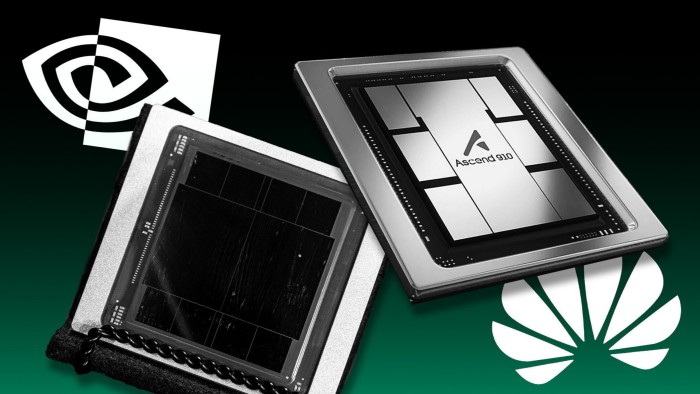Huawei is looking to grab a bigger share of the Chinese market for artificial intelligence chips dominated by Nvidia, helping local companies adopt its rival’s silicon for so-called “inference” tasks.
China’s leading artificial intelligence companies rely on graphics processing units (GPUs) made by Nvidia to “train” large language models, with the $3.4 trillion US chipmaker’s products seen as vital to the development of the technology.
Rather than challenging Nvidia in training, Huawei is positioning its latest Ascend AI processors as the hardware of choice for Chinese groups running “inference,” the computation undertaken by LLMs to generate an answer to a request.
The Chinese tech giant is betting that inference will be a bigger source of demand in the future if the pace of model training slows and artificial intelligence applications like chatbots become more widespread.
“Training is important, but it only happens a few times,” said Georgios Zacharopoulos, a senior AI researcher working on inference acceleration at Huawei’s Zurich lab. “Huawei is mainly focused on conclusions, which will ultimately serve more customers.”
According to company employees and Ascend customers, it is focused on the less technically challenging but potentially profitable route of retrofitting AI models trained on Nvidia products to use Ascend chips. Since Nvidia and Ascend’s GPUs run on different software, Huawei is helping the companies use a different software tool to make the two systems compatible.
Huawei’s push comes with top-down government support. Chinese officials have urged local tech giants to buy more of Huawei’s AI chips and move away from Nvidia.
A person familiar with Nvidia’s China operations said Huawei was seen internally as the most serious competitor in the country, adding that its chip design capability was “advanced”.
Washington has sought to curb Beijing’s development of artificial intelligence with export controls aimed at hindering the development of sensitive technologies in China.
Unlike their American rivals like OpenAI and Google, the companies are unable to use the latest GPUs in China. But even though Chinese groups are only able to buy Nvidia’s H20 chips tailored to meet export controls, the less powerful GPUs remain in high demand as they are considered better than local alternatives.

Huawei analysts and researchers said Ascend was not yet ready to replace Nvidia for training models because of technical issues, such as a breakdown in how the chips interact with each other within a broader AI chipset when training larger and larger models.
“While Ascend chips perform well on a chip-by-chip basis, there is a bottleneck with chip-to-chip connectivity,” said Lin Qingyuan, Bernstein’s semiconductor analyst in China. “When you train a large model, you have to break it down into smaller tasks. If one chip fails, the software has to find a way for other chips to take over without delay.”
The next challenge for Huawei is to convince developers to switch from Nvidia’s Cuda software, known as the company’s “secret sauce” for being easy for developers to use and capable of greatly speeding up data processing.
But Huawei’s upcoming and updated version of its AI chip, the Ascend 910C, is also expected to address these concerns. “We expect this new generation of hardware to come with improved software that makes it more accessible to developers,” said a Huawei employee, who declined to be named.
Huawei and Nvidia face fierce competition. Chinese Internet group Baidu and chip designer Cambricon have made advances in AI chip development. Meanwhile, in the US, Amazon and Microsoft are betting they can grab more market share in inference chips as AI applications become more widespread.
Estimates from SemiAnalysis, a chip consultancy, suggest that Nvidia made $12 billion in sales in China last year by distributing 1 million of its H20 chips in the country, selling twice as many AI chips as Huawei with its Ascend 910B.
“Nvidia’s China-specific H20 GPUs make up the majority of AI chips sold in China. But the lead is narrowing fast as Huawei ramps up production capacity,” said Dylan Patel, chief analyst at SemiAnalysis.
Industry insiders warned that Huawei’s AI chip push was also being limited by insufficient supply, with two potential customers telling the Financial Times they were unable to secure the chips.
Huawei did not respond to a request for comment. Nvidia declined to comment.
Analysts have said Huawei’s production is likely to face challenges due to US export controls that have left Chinese factories dependent on outdated chip-making equipment.

The focus on inference also points to an emerging dynamic in Chinese AI that differs from the US. Washington’s export controls mean Chinese AI players are not involved in the same race as Silicon Valley rivals Meta, x.AI and Elon Musk’s OpenAI to build mega-arrays of cutting-edge GPUs of Nvidia.
“Chinese companies are playing a different game. They are paying much more attention to inference than the US, because it is possible to achieve large gains in efficiency even with less powerful chips, which also means they can reach commercialization faster,” the analyst said. of Bernstein, Lin.
Chinese companies are betting that they can stay competitive in AI by lowering the cost of inference, which in turn makes AI applications cheaper to run, he said.
Last month, Hangzhou and Beijing-based start-up DeepSeek released its V3 model, which attracted attention due to its low training and inference costs compared to comparable models in the US.
The company proposed a new way for an AI model to selectively focus on particular pieces of input data as a way to reduce the costs of running the model. It also used the “Expert Mixing” technique popular with other Chinese AI businesses, which also helps speed up completion as only part of the model is used to generate an answer.
DeepSeek said Huawei had successfully adapted the V3 to the Ascend, providing detailed instructions for developers on how to use the chip. The FT previously reported that Huawei had sent engineers to help customers migrate from Nvidia to Ascend.
Additional reporting by Zijing Wu in Hong Kong


